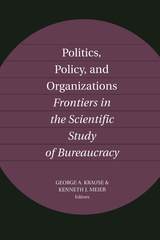
Public administration has evolved into an extraordinarily complex form of governance employing traditional bureaucracy, quasi-government public organizations, and collaborative networks of nongovernmental organizations. Analyzing and improving government performance—a matter of increasing concern to citizens, elected officials, and managers of the organizations themselves—has in turn become a much more fraught undertaking. Understanding the new complexities calls for new research approaches.
The Art of Governance presents a fresh palette of research based on a new framework of governance that was first developed by coeditor Laurence E. Lynn, Jr., with Carolyn J. Heinrich, and Carolyn J. Hill in their book, Improving Governance: A New Logic for Empirical Research. That book identified how the relationships among citizens, legislatures, executive and organizational structures, and stakeholders interact, in order to better diagnose and solve problems in public management.
This volume takes that relational concept into new realms of conceptualization and application as it links alternative institutional and administrative structures to program performance in different policy areas and levels of government. Collectively, the contributors begin to paint a new picture of how management matters throughout the policy process. They illuminate how, at different levels of an organization, leadership and management vary—and explore both the significance of structural systems and the importance of alternative organizational forms for the implementation of public policies.
The Art of Governance shows that effective governance is much more complex than paint-by-number. But if the variety of forms and models of governance are analyzed using advanced theories, models, methods, and data, important lessons can be applied that can lead us to more successful institutions.

Today’s public managers not only have to function as leaders within their agencies, they must also establish and coordinate multi-organizational networks of other public agencies, private contractors, and the public. This important transformation has been the subject of an explosion of research in recent years. The Collaborative Public Manager brings together original contributions by some of today’s top public management and public policy scholars who address cutting-edge issues that affect government managers worldwide. State-of-the-art empirical research reveals why and how public managers collaborate and how they motivate others to do the same. Examining tough issues such as organizational design and performance, resource sharing, and contracting, the contributors draw lessons from real-life situations as they provide tools to meet the challenges of managing conflict within interorganizational, interpersonal networks. This book pushes scholars, students, and professionals to rethink what they know about collaborative public management—and to strive harder to achieve its full potential.

While the field of public management has become increasingly international, research and policy recommendations that work for one country often do not work for another. Why, for example, is managerial networking important in the United States, moderately effective in the United Kingdom, and of little consequence in the Netherlands? Comparative Public Management argues that scholars must find a better way to account for political, environmental, and organizational contexts to build a more general model of public management. The volume editors propose a framework in which context influences the types of managerial actions that can be used effectively in public organizations.
After introducing the innovative framework, the book offers seven empirical chapters—cases from seven countries and a range of policy areas (health, education, taxation, and local governance)—that show how management affects performance in different contexts. Following these empirical tests, the book examines themes that emerge across cases and seeks to set an agenda for future research. Intended for students and scholars of public administration and public policy, this book will be the first to provide a comprehensive comparative assessment of management’s impact on organizational performance.

George A. Krause is Associate Professor of Political Science, University of South Carolina.
Kenneth J. Meier is Charles Puryear Professor of Liberal Arts and Professor of Political Science, Texas A&M University.
READERS
Browse our collection.
PUBLISHERS
See BiblioVault's publisher services.
STUDENT SERVICES
Files for college accessibility offices.
UChicago Accessibility Resources
home | accessibility | search | about | contact us
BiblioVault ® 2001 - 2024
The University of Chicago Press









